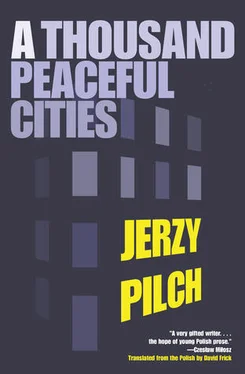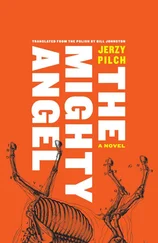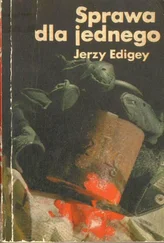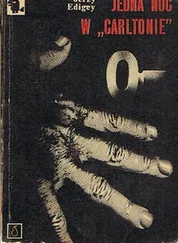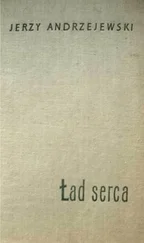•
I was sitting at the table on a wooden bench and staring at an open mathematics notebook. For some time now I had been able to solve every assignment in a flash, and so, out of boredom, I turned, more and more frequently, to noting down the sentences I heard instead of solving algebraic equations. At first I wrote at the speed of sound, that is, equal to the speed of the spoken words. Then I sped up a little, and I wrote faster than the speakers, and I always tried to guess the last, and sometimes even the next-to-last, word in the sentence. This was especially interesting in the case of Mr. Trąba. Stylistically, Mr. Trąba was far more unpredictable than Father. For example, in this case I was certain that the final word of the sentence would be “testament,” but I was wrong. Mr. Trąba was enraged to the brink of madness, and at such moments his unpredictability grew.
“Here’s the proof, Chief,” he shouted spasmodically, “here’s the proof.” And he produced a cheap little graph-paper notebook from his breast pocket, one of a thousand identical notebooks in which I had recorded a thousand mathematical puzzles, and in which I had recently begun to record the sentences I heard.
“Here’s the proof, Chief.” Mr. Trąba flattened the sheets and calmed his breathing. “As I approach the end, I have decided to put my experiences in order and to write down my opinions, at least the most radical of them. I also wanted to produce my biography and a memoir about my honorable ancestors, but I abandoned that idea. After all, as you have correctly observed, all my life I was in the clutches of addiction, and I owe all I have attained in life to that addiction. But writing about this presents a problem, and also shame. Not so much shame before future readers of this worthless copybook as before myself. Similarly, I am uncertain whether my Papa, God rest his soul, would wish that it be made public that he too, for his entire life, was caught in the clutches of an addiction — and there is no way not to make this public, since my Papa was occupied with nothing else. And my Mama, God rest her soul, was caught, and both grandparents, although allegedly Grandpapa on Mama’s side got caught late in his life. In any event, on account of a certain, so to say, aesthetic monotony, I abandoned the idea of memorializing my honorable forebears. I also left out my autobiography, and I decided to content myself with recording my most radical views. But here, too, I was unsuccessful. I began with an appropriate invocation. I scrutinized it, since something in these few lines ineffably vexed me, troubled me. I analyzed them word for word, and I was horrified. . And I abandoned it, since I understood that I had such little time left that there was no way I’d be able to fill up even a sixteen-sheet graph-paper notebook. . Listen, Chief.” And Mr. Trąba opened the notebook to the first page, and, in a trembling voice, and with no concern for punctuation, he began to read:
“To the glory of the Lord and all His works, I begin to intone this ominous song. To the glory of the barn swallow on the windowsill; to the glory of Buffalo Mountain on the horizon; to the glory of the morphinistes; to the glory of hair and to the glory of shampoos; to the glory of the ink pot and to the glory of blotting-pads; to the glory of the candle lighting my way; to the glory of the pencil with which I write; and even to Thy glory, my hateful little graph-paper notebook. .”
Mr. Trąba unexpectedly broke off, looked at Father, and asked, according to the ritual: “So what do you say, Chief?”
“A beautiful apostrophe, and worthy of a fitting reward. But you didn’t say much in that fragment, Mr. Trąba. I’d say that you broke your quill sooner than I would have expected.”
“I said quite enough. Or rather, quite enough was said through me here to make your hair stand on end.” In Mr. Trąba’s voice I heard the distant hoof beats of evil forces. I felt an icy shiver run down my spine.
“I don’t really understand.” Father stuck to his trivializing tone.
“Did you note the phrase ‘To the glory of the barn swallow on the windowsill?’”
“To the glory of the barn swallow?. . Well, yes. . To the glory of the swallow. . A beautiful phrase, poetic, and worthy of reward.” Father glanced in the direction of the sideboard.
“Chief, let’s stop rewarding me for formal artifice, especially since it wasn’t I who was directing my own hand. Have you ever seen a barn swallow on a windowsill?”
Father stared hard at Mr. Trąba.
“Have you ever seen a swallow on a windowsill? You haven’t, because you couldn’t have. It isn’t the habit of those birds, who, you must admit, move awkwardly when they aren’t flying, to alight on windowsills. . With the exception of my windowsill. Do you understand? Every day, at 4:00 or 5:00 in the morning, I see barn swallows on my windowsill, swarms of barn swallows. They go pit-a-pat, they peck, they flap their wings. Time and again they seem ready to spring to flight, but no, they don’t take off. They stay put. There seem to be more and more of them. New ones must be landing there all the time, although I never see them in the air. I only see them on the windowsill, barn swallows on the windowsill, hundreds of swirling barn swallows on the windowsill. Any minute the windowpane will vanish, and they will begin to swarm all over me. . Do you understand? And do you know what is happening on the balcony? Whoever sees a swallow on his windowsill should demolish his balcony — this is the imperfect piece of Solomonic wisdom I have to offer you, Chief.”
Mr. Trąba’s trembling hand moved like a chess-piece knight on his horse, or perhaps it moved on the trail of other elusive animals.
“To the glory of the salamander? To the glory of the toad? To the glory of the grasshopper? To the glory of the vulture and the iguana? To the glory of the rat and the swallow?”
Father gulped.
“And what do you do then? Do you run away?”
Mr. Trąba shrugged.
“I employ the simplest method, after which they disappear without a trace. At least for the moment.”
He glanced once again at the invocation written in a wobbly hand and at the poetic introduction to a litany of radical views that would never be immortalized, and he shook his head in disapproval.
“That bit about the morphinistes didn’t come out right either: ‘to the glory of the morphinistes’—a hurried tribute paid to extemporaneity, although there is a strong literary tradition of that type. Do you know, Chief, Charles Baudelaire’s poem ‘To a Passerby?’”
“I don’t,” Father muttered.
“Even if you don’t know it, I hope that you believe me, that you believe me now, that my brain, pecked to shreds by delirious fowl, is getting ready to meet the Other World.”
Father was silent. Mr. Trąba’s voice was unexpectedly cheerful.
“I’ve been thinking a long time, Chief, a long time, and I know more or less what I should do for humanity with my last deed. Except that my knowledge is general, and my deed must be concrete.”
“Mr. Trąba, if I were in your place. .” Father’s voice echoed with a gravity and a puffed-up didacticism that I couldn’t stand. “If I were in your place, and if I truly knew, let’s say, that I would die the day after tomorrow, I would live tomorrow just the same as yesterday. I would eat breakfast, I would seek out the truth between the lines in The People’s Tribune , I would work in the garden. .”
“I appreciate the beauty and nobility of the idea of living tomorrow like today or yesterday, but that sort of beauty and that sort of nobility have nothing to do with me. From birth, Chief, I have lived my life under constant pressure for change. For as long as I can remember, I have promised myself that tomorrow would be different from yesterday, next week different from the past. For as long as I can remember, my today is always supposed to be a caesura between the old and the new life. For as long as I can remember, I’ve been trying, every day, to change something. And now, when an unavoidable change is approaching, when my presence will quickly change into my absence, I intend to do something for the world as long as I’m still here, something which — I won’t hide the fact — will relieve the monotony of the final act of my existence on this vale of tears, with respect to both form and content.”
Читать дальше
